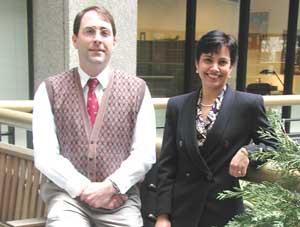Profiles
- Contact: Website Administrator
- 4/1/2003
Mark Gehlhar & Anita Regmi

Changing consumer preferences are driving changes in the way food is produced, marketed, and traded. With world economies growing more integrated and both capital and technology moving more freely across national boundaries, the welfare of U.S. food producers is increasingly tied to foreign consumers. That's where ERS's Mark Gehlhar and Anita Regmi come in. Three years ago, together with other researchers in ERS, they began to investigate changes in food consumption and its implications for international trade. Since then, as public interest has grown, they have broadened their analyses to cover new market developments, including how retailing, cost-reducing technologies, and foreign manufacturing are changing the global landscape of food markets. They are now probing international retail sales and trade data to identify different strategies employed by food suppliers in meeting consumer demand in the global marketplace. Their work illustrates that the U.S. food industry is a unique combination of export-dependent sectors and less trade-oriented firms that often own foreign assets and global brands. As such, trade numbers and financial performance of the U.S. food sector do not always align, since U.S. food companies sell five times more through sales via foreign affiliates in overseas markets than through U.S. export sales.
Mark and Anita contend that growing income, shifting diets, and restructuring in food retailing will largely shape global food trade in the coming years. Early work from their project is presented in Changing Structure of Global Food Consumption and Trade, WRS-01-1. Along with a team of ERS researchers, they are also working on 'Global Markets for High-Value Foods,' which will be released later this year. In February 2003, Mark and Anita organized a workshop on the same topic to generate a discussion on the changes taking place in the global food economy and examine its relevance for policymakers (proceedings will be posted at www.farmfoundation.org).
Mark has had a longstanding interest in trade and economic development, and has been involved in the Global Trade Analysis Project, a collaborative effort among national and international universities and research institutions to build a global policy and trade analysis tool. Much of his research has focused on structural shifts in global trade and impacts of policy, technical change, and economic growth. Anita's research interests have been wide and varied, ranging from groundwater pollution, integrated pest management, and trade in developing countries to changing food preferences and the global food market. In addition to conducting research, Anita has policy experience from her 4-year stint with USDA's Foreign Agricultural Service (FAS). While at FAS, Anita focused on international agricultural commodity markets and bilateral/multilateral trade agreements. As a member of the FAS team in charge of World Trade Organization negotiations, she oversaw agricultural issues concerning developing countries.
Global Consumer Markets Team

Front row (left to right): Anita Regmi, Delmy Salin, Suchada Langley, Agapi Somwaru; Second row (left to right): Shiva Makki, Stefan Osborne, Chris Bolling, Carlos Arnade, Thomas Vollrath; Third row (left to right): James Cash, Christopher Davis, John Wainio, Mark Gehlhar, Greg Price, James Hansen
Recognizing the need to meld the expertise of many people in order to address the research questions related to global food markets comprehensively, Mark and Anita are now leading a newly formed research team. A wide array of emerging issues are on the agenda for further research. For example, how does market coordination between retailing and processing firms affect global and intraregional food trade? And how do government policy and technological change influence the location of food production and manufacturing? Several researchers in ERS's Market and Trade Economics Division (MTED) have investigated aspects of these issues. The 15-person team draws expertise from different branches within MTED. Several researchers have country- or industry-specific knowledge, while others are experts in theories of trade, foreign investment, and consumer behavior. The diversity of the group is a great asset for the project, which will help USDA and its stakeholders confront the maturing markets in industrialized countries while tapping the growing middle-class demand in developing countries.

